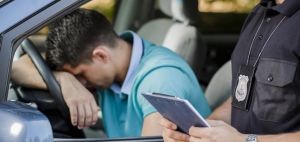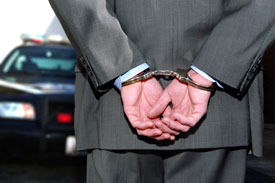
Driving under the influence is a serious problem; about one third of fatal car accidents in the United States are related to drunk driving.
Being pulled over for a traffic stop is stressful no matter what the reason. However, the possibility of being arrested for an OWI (Operating While Intoxicated, also known as DUI) can make things much worse. If you are pulled over for a traffic stop or on suspicion of drunk driving, it is critical that you know your rights and what to do.
Here are the steps you should follow when stopped for drunk driving.
1. Remain calm and be nice! Nothing good will come of being angry, yelling or crying at the police
officer. Remember that officers are trained to look for drunk drivers. They will likely always start with the presumption that you are driving under the influence – especially on a holiday like St. Patrick’s Day.
2. Have all of your driving information easily accessible and ready to give to officers. Keep your registration and insurance information together and in a place easy to find. Your driver's license should be kept in an easily accessed area of your purse or wallet. Do not get out of the car unless the officer tells you to and keep your hands on the steering wheel in plain sight.
3. At all times, avoid talking any more than absolutely necessary.
The police will use every word you say against you. You have the right to remain silent - use it! Despite what you may think, you will not talk your way out of a drunk driving charge.
you say against you. You have the right to remain silent - use it! Despite what you may think, you will not talk your way out of a drunk driving charge.
4. It is very likely you will be asked "Do you know why I pulled you over?" Say "no." You do not have to answer. This question is designed to get you to admit your guilt on something like speeding or going through a red light. This gives them probable cause to pull you over and will make it harder for your lawyer to get the stop thrown out. Many times, OWI cases are won or lost depending on whether the officer can prove adequate cause for pulling you over. You may also be asked question about where you are going and where you are coming from. Remain silent or just answer, "I'd rather not say." You do not have to answer their questions!
5. You will also almost certainly be asked "Have you been drinking?" or "How much have you had to drink?" Again, the answer is "I'd rather not answer." If you admit to drinking, you only hurt yourself. If you lie, you hurt yourself. Remember to always say, "I have the right to remain silent." If the officer asks you anything about your drinking you should simply say "I am exercising my right to remain silent." Many people say "a few beers" or something similar, this is admitting that you were drinking, which helps let the officer arrest you and take you for a blood test. Other people saying something to the effect of "I don’t recall", this implies that you were drinking and that you were drinking so much you can't remember. You should not help the police make the case against you, even if it is obvious that you have been drinking.
 6. You will be asked to step out of your car - comply. When you do shut and lock your car door. It is very possible that the officer will challenge you about this move and ask if you have something to hide. This cannot be stressed enough, do not say anything just answer, "I'd rather not say." Officers may ask you if they can look inside your vehicle. Your response is: "No. you cannot search my car."
6. You will be asked to step out of your car - comply. When you do shut and lock your car door. It is very possible that the officer will challenge you about this move and ask if you have something to hide. This cannot be stressed enough, do not say anything just answer, "I'd rather not say." Officers may ask you if they can look inside your vehicle. Your response is: "No. you cannot search my car."
7. It is almost certain that the officer will ask you to do field sobriety tests. You are not required to do field sobriety tests (such as standing on one leg, walking on a line, or saying the alphabet). You should not perform field sobriety tests. You can refuse! The only reason you are asked to perform these tests, it can be used against you, refusing cannot be used as probable cause. Simply state "I do not want to do any field sobriety tests."
8. You will likely be asked to blow into a handheld portable breathalyzer - called a "preliminary breath test." Refuse to take this test as well. Consenting to the test allows only provides the officer more evidence against you.
9. Once you a transported to the police station or hospital, you will be asked for a breath or blood test. As a general rule, you should consent to this test. Refusing could constitutes a refusal – which is almost as bad as the OWI itself. After the testing the office will decide to arrest or not.

Following these steps will not be easy. Officers may get upset and threaten you. It is important to remember that it is better to do one night in jail with the hopes of potentially beating your charge than sitting several days or months in jail and paying thousands of dollars in fines and fees.
A drunk driving arrest may result many serious penalties, but a good OWI defense lawyer can help. It may mean the difference between keeping your license or losing you license.
OWI cases are complex and many lawyers are not equipped to properly fight them. If you or someone you love has been charged with an OWI contact the skilled and experienced lawyers at Jones Law Firm to set up a free consultation. Please contact us by text or phone at (414) 774-6000 or email at laura@jlfwisconsin.com anytime.
*Any articles in the Libra or posted by Jones Law Firm LLC are not legal advice for a particular client or situation. Further no attorney-client relationship is intended or created with this post.*

